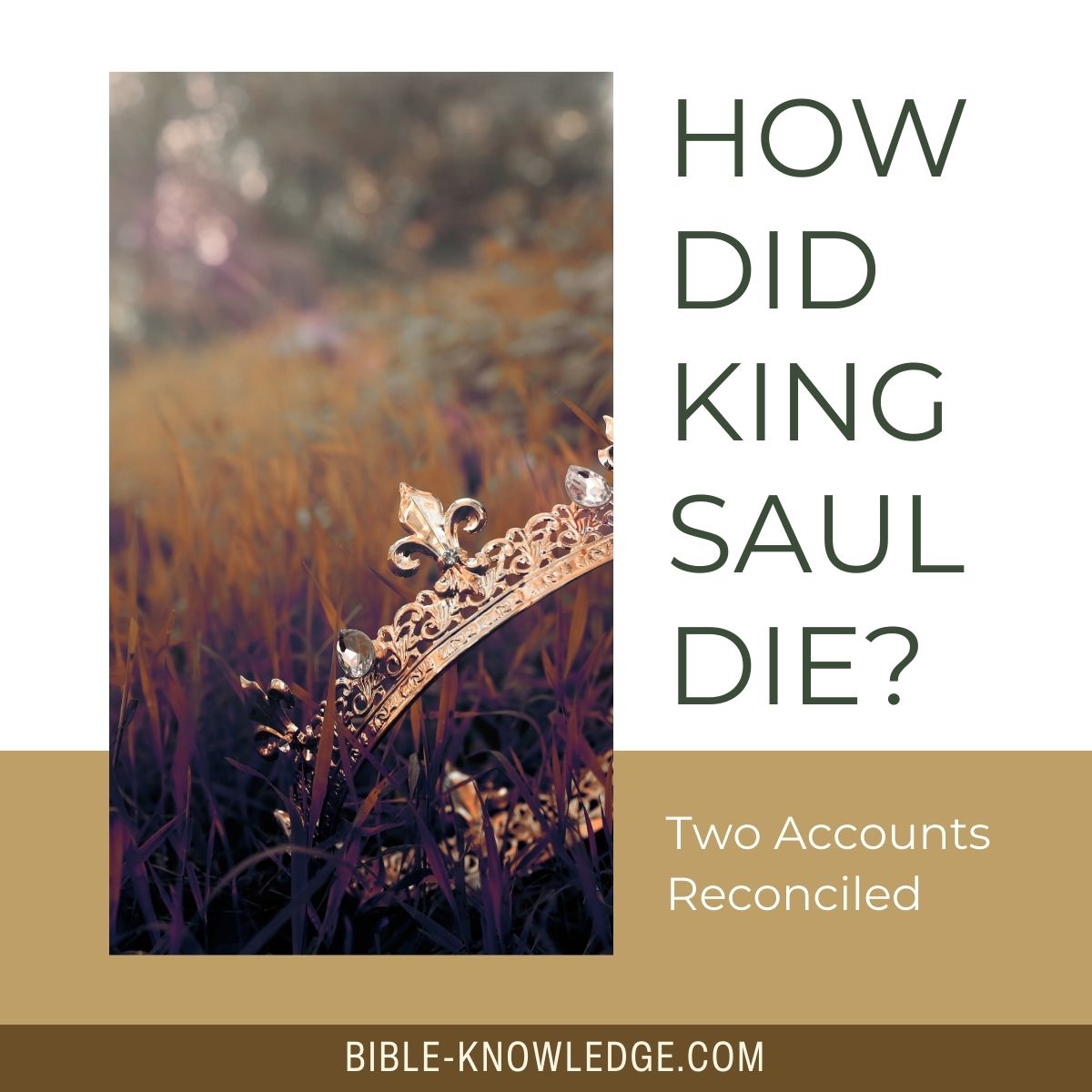How did King Saul die? This may not seem like a question worth pondering for some, but it is when you consider that the Bible provides two accounts of King Saul’s death in battle. The Bible is not contradictory (that’s not what I’m getting at here), but one passage regarding Saul’s death says that he fell on his own sword while the other has someone other than Saul’s armorbearer claiming credit for killing Saul.
So, how did it happen? Did Saul kill himself by falling on his sword? Did Saul tell his armorbearer to kill him? Did someone else kill Saul? Did that person kill Saul of their own volition, or did they do it at Saul’s command? To get to the bottom of what happened, we have to visit the passages regarding Saul’s death. Fortunately, the two accounts can be found in back-to-back chapters of Scripture.

Saul falls on his own sword (1 Samuel 31)
Now the Philistines fought against Israel; and the men of Israel fled from before the Philistines, and fell slain on Mount Gilboa. 2 Then the Philistines followed hard after Saul and his sons. And the Philistines killed Jonathan, Abinadab, and Malchishua, Saul’s sons. 3 The battle became fierce against Saul. The archers hit him, and he was severely wounded by the archers.
4 Then Saul said to his armorbearer, “Draw your sword, and thrust me through with it, lest these uncircumcised men come and thrust me through and abuse me.”
But his armorbearer would not, for he was greatly afraid. Therefore Saul took a sword and fell on it. 5 And when his armorbearer saw that Saul was dead, he also fell on his sword, and died with him. 6 So Saul, his three sons, his armorbearer, and all his men died together that same day.
7 And when the men of Israel who were on the other side of the valley, and those who were on the other side of the Jordan, saw that the men of Israel had fled and that Saul and his sons were dead, they forsook the cities and fled; and the Philistines came and dwelt in them. 8 So it happened the next day, when the Philistines came to strip the slain, that they found Saul and his three sons fallen on Mount Gilboa. 9 And they cut off his head and stripped off his armor, and sent word throughout the land of the Philistines, to proclaim it in the temple of their idols and among the people. 10 Then they put his armor in the temple of the Ashtoreths, and they fastened his body to the wall of Beth Shan.
11 Now when the inhabitants of Jabesh Gilead heard what the Philistines had done to Saul, 12 all the valiant men arose and traveled all night, and took the body of Saul and the bodies of his sons from the wall of Beth Shan; and they came to Jabesh and burned them there. 13 Then they took their bones and buried them under the tamarisk tree at Jabesh, and fasted seven days. (1 Samuel 31:1-13)
1 Samuel 31 follows after Saul goes and visits the witch at Endor and engages in a seance to talk to Samuel, who at this point had died. We know that Samuel talked with Saul, telling him that he and his sons would die the following day and “be with him” (they would die, just as he, Samuel, was already dead). Sure enough, 1 Samuel 31 follows the seance event in which Saul is told of he and his sons’ demise, and this chapter shows the battle between the Philistines and the Israelites. Saul went to the seance to find out what to do about the Philistines, who were soon to go to battle against Saul and the Israelite army. Saul had consulted God at first, but, as 1 Samuel 16 says, “the Spirit of the Lord departed from Saul, and an evil spirit came upon him.” The Holy Spirit left Saul, so the Lord was no longer with him. This explains why, when Saul prayed, he received no answers from the Lord.
Well, 1 Samuel 31:3 says that the archers killed Saul: “The archers hit him, and he was severely wounded by the archers.” The Greek phrase for “archers” is οἱ ἀκοντισταί (hoi akontistai), meaning “dartmen,” those who shoot darts (archers do this). The word for “severely wounded” is the Greek verb ἐτραυματίσθη (etraumatisthe), from where our English word “traumatized,” comes. Saul was “severely traumatized,” trauma referring to wounds and injuries. So Saul was severely injured as a result of the dartmen chasing him and shooting darts at him. He was severely injured “in the abdomen,” the word for “abdomen” in the Greek being τὰ ὑποχόνδρια (ta hupoxondria). Saul was hurt in the abdomen area.
Saul then tells “the one bearing his sword,” meaning “armorbearer,” to kill him: “Draw your sword and thrust me through with it, lest these uncircumcised men come and thrust me through and abuse me” in verse 4. The word for sword is the Greek ῥομφαίαν (romphaian), and Saul tells the armorbearer to draw the sword and kill him with it. The armorbearer refuses though, because of the Greek phrase ὅτι ἐφοβήθη σφόδρα (hoti ephobethe sphodra). The armorbearer didn’t kill Saul because he greatly (Greek, σφόδρα) feared. He was afraid. When Saul realized that the armorbearer wouldn’t kill him, he fell on his own sword. The armorbearer, seeing Saul dead, fell on his own sword to die with King Saul.
In 1 Samuel 31, we see that Saul kills himself by falling on his own sword after he wanted the armorbearer to kill him. According to this account, Saul killed himself.
Now, we’ll take a look at the second biblical passage that sheds some light on the account of Saul’s death.
An Amalekite claims responsibility for Saul’s death (2 Samuel 1)
2 Samuel 1 is where we see an alternative account of Saul’s last moments given by an Amalekite, a Gentile. According to Scripture, the Amalekite says that he killed Saul because Saul told him to:
Now it came to pass after the death of Saul, when David had returned from the slaughter of the Amalekites, and David had stayed two days in Ziklag, 2 on the third day, behold, it happened that a man came from Saul’s camp with his clothes torn and dust on his head. So it was, when he came to David, that he fell to the ground and prostrated himself.
3 And David said to him, “Where have you come from?”
So he said to him, “I have escaped from the camp of Israel.”
4 Then David said to him, “How did the matter go? Please tell me.”
And he answered, “The people have fled from the battle, many of the people are fallen and dead, and Saul and Jonathan his son are dead also.”
5 So David said to the young man who told him, “How do you know that Saul and Jonathan his son are dead?”
6 Then the young man who told him said, “As I happened by chance to be on Mount Gilboa, there was Saul, leaning on his spear; and indeed the chariots and horsemen followed hard after him. 7 Now when he looked behind him, he saw me and called to me. And I answered, ‘Here I am.’ 8 And he said to me, ‘Who are you?’ So I answered him, ‘I am an Amalekite.’ 9 He said to me again, ‘Please stand over me and kill me, for anguish has come upon me, but my life still remains in me.’ 10 So I stood over him and killed him, because I was sure that he could not live after he had fallen. And I took the crown that was on his head and the bracelet that was on his arm, and have brought them here to my lord.”
11 Therefore David took hold of his own clothes and tore them, and so did all the men who were with him. 12 And they mourned and wept and fasted until evening for Saul and for Jonathan his son, for the people of the Lord and for the house of Israel, because they had fallen by the sword.
13 Then David said to the young man who told him, “Where are you from?”
And he answered, “I am the son of an alien, an Amalekite.”
14 So David said to him, “How was it you were not afraid to put forth your hand to destroy the Lord’s anointed?” 15 Then David called one of the young men and said, “Go near, and execute him!” And he struck him so that he died. 16 So David said to him, “Your blood is on your own head, for your own mouth has testified against you, saying, ‘I have killed the Lord’s anointed.’” (2 Samuel 1:1-16)
David had become victorious in his battle against the Amalekites; don’t you find it interesting that an Amalekite comes from the battle where Saul is killed to claim credit for the death of King Saul? It seems highly suspicious, designed to bring glory and fame to the one bringing the bracelet and crown to King David. The young Amalekite believed that he would be rewarded for Saul’s death:
Then the young man who told him said, “As I happened by chance to be on Mount Gilboa, there was Saul, leaning on his spear; and indeed the chariots and horsemen followed hard after him. 7 Now when he looked behind him, he saw me and called to me. And I answered, ‘Here I am.’ 8 And he said to me, ‘Who are you?’ So I answered him, ‘I am an Amalekite.’ 9 He said to me again, ‘Please stand over me and kill me, for anguish has come upon me, but my life still remains in me.’ 10 So I stood over him and killed him, because I was sure that he could not live after he had fallen. And I took the crown that was on his head and the bracelet that was on his arm, and have brought them here to my lord.” (2 Samuel 1:6-10)
The Amalekite says that “I happened by chance to be on Mount Gilboa, there was Saul, leaning on his spear.” Saul did indeed lean on his spear, but the interesting part is that the Amalekite says, “He said to me again, ‘Please stand over me and kill me, for anguish has come upon me” (v.9). In verse 10, the man says he did as Saul instructed him to do and killed him.
Here in 2 Samuel 1, we see that an Amalekite claims credit for Saul’s death, while in 1 Samuel 31, Saul tells his armorbearer to kill him because he had been severely wounded by the archers. These accounts can’t both be right.
Getting to the Truth
The question becomes, “If both sound contradictory, then there has to be one correct and one incorrect.” 1 Samuel 31 and 2 Samuel 1 are presenting two different accounts of how it happened.
Is there one account that we can deem the correct one? If so, which one is incorrect and wrong or falsified? It’s not hard to figure out. In 1 Samuel 31, Saul’s armorbearer dies in response to the death of King Saul. This makes sense, seeing that armorbearers, by nature, are loyal to their King or leader. Thus, we can believe that Saul asked his armorbearer to kill him. As he said in 1 Samuel 31, he didn’t want “these uncircumcised men [to] come and thrust me through and abuse me” (1 Samuel 31:4). Notice that Saul referred to his enemies as “these uncircumcised men,” uncircumcised being translated from the Greek word ἀπερίτμητοι (aperitmetoi), this adjective coming from a word that means “circumcised” (Greek peritome). Pronounced Pair-Ri-ta-MAY, the adjective refers to Gentiles because the Jews had been circumcised as members of the people of God. Thus, when Saul told his armorbearer to kill him, he did so to prevent his death at the hands of the Gentiles around him (he was in battle with the Philistines).
In 2 Samuel 1, the account of the Amalekite visiting David after Saul’s death, we find that the Amalekite lies when he claims that Saul wanted he, a Gentile, to kill himself, a Jew. Remember?
He says to David, “Now when he looked behind him and saw me, he called out to me. And I answered, ‘Here I am.’ And he said to me, ‘Who are you?’ So I answered him, ‘I am an Amalekite’” (2 Samuel 1:7-8)
In these verses, we see the lie. King Saul fell on his sword after asking the armorbearer to kill him. The armorbearer died after him, having seen him fall on his sword. What time was there for the Amalekite to come along and kill Saul? Very little; in fact, none at all. So when he says that Saul asked who he was, he was lying for two reasons. First, he was lying because Saul wouldn’t have talked with a Gentile. In fact, the Amalekite claims that he was “on Mount Gilboa” (2 Samuel 1:6). He was far away from the scene where Saul was killed. How would he have ever had any contact with Saul?
He would have had to be in the battle for Saul to talk with him. He runs from Saul’s camp after Saul had died, but he never had time to talk with him because he was at a distance viewing the ordeal.
Next, we see the Amalekite advance his lie: “He said to me again, ‘Please stand over me and kill me, for anguish has come upon me, but my life still remains in me” (2 Samuel 1:9). Saul, apparently, told the Amalekite twice to kill him. But why would he have been talking to the Amalekite? What time would he have had as a wounded man to even address the Amalekite? If the armorbearer died after Saul, and Saul died before him, then how would any of this imaginary conversation with the Amalekite have happened? In the sequence of events, when could it have happened?
The Amalekite then says, “So I stood over him and killed him, because I was sure that he could not live after he had fallen” (2 Samuel 1:10). Notice the Amalekite says “I was sure that he could not live.” How did he know? Was he omniscient? Was he a medical doctor? How then, could he kill Saul on his own personal estimation? His statement here translates into the following: “I saw Saul, injured, and decided that, since he likely wouldn’t live beyond the moment, I’d kill him and claim credit.” If Saul was dying, then why kill him any sooner? The only reason why the Amalekite would’ve killed Saul sooner (despite the fact he was already on his way to dying anyway; the archers had severely wounded Saul, see 1 Samuel 31:3) is to claim fame for himself. He was hoping that claim credit would promote him in the eyes of David.
There’s another point worth making: why would Saul have asked the Amalekite to kill him when he asked his armorbearer and then fell on his own sword? The Amalekite wasn’t even involved in the battle. Last but not least, the Amalekite refers to David as “my lord” in 2 Samuel 1:10. It’s obvious that the Amalekite wanted to make a name for himself from the two accounts. The Amalekite’s story doesn’t match what actually happened in 1 Samuel 31.
The Amalekite took advantage of a vulnerable situation because there were no witnesses (the armorbearer and King Saul had died), so no one could vouch for the conversation or contradict it. After “killing” Saul, as he claims, he then took Saul’s bracelet and crown as “spoils of war” to bring to King David. The Amalekite must have known about the war between Saul and David and thought that David would praise him, perhaps promote him or let him serve in the Israelite army, as a result of his supposed “killing” of King Saul. And yet, what happened to the Amalekite was unlike anything the Amalekite believed in his mind:
14 So David said to him, “How was it you were not afraid to put forth your hand to destroy the Lord’s anointed?” 15 Then David called one of the young men and said, “Go near, and execute him!” And he struck him so that he died. 16 So David said to him, “Your blood is on your own head, for your own mouth has testified against you, saying, ‘I have killed the Lord’s anointed.’” (2 Samuel 1:14-16)
David calls Saul “the Lord’s anointed” twice (vv. 14, 16) and then tells a young man to execute the Amalekite. “Your blood is on your own head, for your own mouth has testified against you,” David says. Now, David wasn’t there to see what happened. He didn’t know that Saul and Jonathan have died, and once he learns of their deaths from the Amalekite, he mourns for them:
11 Therefore David took hold of his own clothes and tore them, and so did all the men who were with him. 12 And they mourned and wept and fasted until evening for Saul and for Jonathan his son, for the people of the Lord and for the house of Israel, because they had fallen by the sword. (2 Samuel 1:11-12)
David and his men mourned for Saul and Jonathan, as well as the nation, because of what had happened. This tells us that David had no way of knowing. The death had taken place, David wasn’t there, so he took the Amalekite’s word for it. And yet, the Amalekite was lying, but David kills him not based on the factuality or truth of the Amalekite’s words, but rather, because he claimed he killed the king of Israel.
David’s words reconcile the two accounts of Saul’s death (2 Samuel 4)
I’ve already offered up what I believe to be the truth behind the two accounts based on the details, but David gives us a way to reconcile the two accounts by way of his own words three chapters away, in 2 Samuel 4:
When Saul’s son heard that Abner had died in Hebron, he lost heart, and all Israel was troubled. 2 Now Saul’s son had two men who werecaptains of troops. The name of one was Baanah and the name of the other Rechab, the sons of Rimmon the Beerothite, of the children of Benjamin. (For Beeroth also was part of Benjamin, 3 because the Beerothites fled to Gittaim and have been sojourners there until this day.)
4 Jonathan, Saul’s son, had a son who was lame in his feet. He was five years old when the news about Saul and Jonathan came from Jezreel; and his nurse took him up and fled. And it happened, as she made haste to flee, that he fell and became lame. His name was Mephibosheth.
5 Then the sons of Rimmon the Beerothite, Rechab and Baanah, set out and came at about the heat of the day to the house of Ishbosheth, who was lying on his bed at noon. 6 And they came there, all the way into the house, as though to get wheat, and they stabbed him in the stomach. Then Rechab and Baanah his brother escaped. 7 For when they came into the house, he was lying on his bed in his bedroom; then they struck him and killed him, beheaded him and took his head, and were all night escaping through the plain. 8 And they brought the head of Ishbosheth to David at Hebron, and said to the king, “Here is the head of Ishbosheth, the son of Saul your enemy, who sought your life; and the Lord has avenged my lord the king this day of Saul and his descendants.”
9 But David answered Rechab and Baanah his brother, the sons of Rimmon the Beerothite, and said to them, “As the Lord lives, who has redeemed my life from all adversity, 10 when someone told me, saying, ‘Look, Saul is dead,’ thinking to have brought good news, I arrested him and had him executed in Ziklag—the one who thought I would give him a reward for his news. 11 How much more, when wicked men have killed a righteous person in his own house on his bed? Therefore, shall I not now require his blood at your hand and remove you from the earth?” 12 So David commanded his young men, and they executed them, cut off their hands and feet, and hanged them by the pool in Hebron. But they took the head of Ishbosheth and buried it in the tomb of Abner in Hebron. (2 Samuel 4:1-12)
The context of 2 Samuel 4 concerns the death of Saul’s remaining son, Ishbosheth. Keep in mind that Saul and his son Jonathan, among other sons of his, all died in the battle against the Philistines. And yet, Saul had one more son remaining: Ishbosheth. Now, David compares the Ishbosheth murder to the murder of King Saul by recounting the events of the Saul/Jonathan/other sons deaths in battle. David says that when the Amalekite brought news of Saul’s death and claimed that he’d killed the King, David had him executed because he believed he’d be rewarded for bringing the news of Saul’s death. In the same vein, David said that Ishbosheth’s murder would be avenged because Saul’s son was murdered while he was in bed, unable to defend himself and helpless to do so.
Conclusion
1 Samuel 31 says that Saul fell on his sword after pleading with his armorbearer to kill him. 2 Samuel 1 says that an Amalekite killed him (the Amalekite’s confession). What do we believe? In all honesty, 1 Samuel 31 is the more accurate account for a few reasons.
First, the Amalekite was on Mount Gilboa, away from the scene, so he wouldn’t have talked to Saul. Saul didn’t know him and didn’t have time to ask questions as he was dying.
Secondly, the Amalekite was a Gentile, “the son of alien,” per his own confession in 2 Samuel 1:13. Saul didn’t want “uncircumcised” (1 Samuel 31:4) men killing him, so he would’ve never wanted an Amalekite to kill him. This contradicts the Amalekite’s own confession that Saul talked to him. If Saul asked his armorbearer to kill him, he was in his right to do so because the job of the armorbearer was to defend the king or the person they were hired by (or the person’s family, etc.). Why would Saul have chosen the Amalekite over his own armorbearer? The Amalekite wants to rewrite the account, but thankfully, we have 1 Samuel 31 to fall back on when assessing the two accounts.
Last but not least, why would the Amalekite bring back the crown and bracelet if he only killed Saul because Saul told him to? Saul would have never told a Gentile to kill him because that was his greatest fear in his death (Saul’s words to the armorbearer), but what’s even more astonishing is that, if the Amalekite were faithful to Saul and called David “my lord,” why would he have made sure to bring the crown and bracelet to David? What was the point of bringing those spoils of war back? If you lose someone who matters to you at war, are you thinking about bringing back a crown and bracelet? No, not at all. Perhaps he thought he’d get to keep the crown and bracelet, or perhaps he believed David would put them on and reward him.
In the end, we see that the Amalekite is lying when he talks with David. It appears that he saw a golden opportunity to cash in on the death of the Israelite king by going to the new king-elect to make him think he’d eliminated the former king. In the process of lying, it cost the Amalekite his life because assuming to have been the killer of King Saul is a feat only a wicked, evil persons would want to claim. No honest person would want to claim he or she killed or murdered someone.





Mr Praise God! The teachings are very interesting and educative also putting us some where in spiritual realm.
may the good God reward you for that,
I need more knowledge about King Saul after Holy Spirit has departed from him and he seek help from Prof Samuel whose already dead there after seeing seance to try to help him fro all his problem.The question now is even the dead people can see us or else talk to us living human because others are saying when a person is dead cant talk to us. How did he get that right.
You have asked a good question… It will be Paramount to understand that after the fall of man in the garden of Eden, man lost Dominion and authority to the devil… That means man also lost life itself and death set in ,the devil took the scepter that had fallen from man and now he controlled everything including the realm of the dead… he had the authority of the death and that’s why the witch at endor could raise the spirit of Samuel., (This implies that the devil chained the souls of Righteous people in the dangeons), As a matter of fact this explains why God had to come to the World as a man so as to access the realm of the dead and take back that authority from the devil because only as a man could he die and enter Hell…. That’s why when Jesus died, He went straight to Hell and released those souls that were held in those gloomy dangeons since when man fell and the Bible says they ressurrected and were seen by many.. Matthew 27: 52-53
In revelation 1:18 we see that now Jesus The KEY OF LIFE AND DEATH
That’s the great hope we have as Christians that the authority we lost at the garden of Eden has been restored to us through the finished work of the cross.
Thanks so much for your articles they’re well interpreted.
This is what the believers need.
Job well done! glory to Jesus stay blessed.
I agree with this account; however, i still question:
1. Did the Amalekite witness the death of King Saul, from a distance in order to obtain the crown & bracelet BEFORE the king was found, beheaded and pinned to the wall; OR,
2. Was the Amalekite a part of the group searching through the dead bodies AFTER the battle?
I realize we were NOT THERE, but would not the Philistines need a way to identify Saul as King and Saul’s son?
The Amelikite says he has escaped from the Camp of the Israelites. I t is most likely that though he was an alien, he lived in Israel, perhaps as a slave carrying stuff even during the war. King Saul, after asking his own Armor-bearer to kill him, may have turned to the Slave who was there, asking him to hold his sword while he (King Saul) runs himself through. I think of Brutus in Julius Caesar dying in the same way by running towards his own sword held by someone else. It is still suicide. Or shall I call it assisted suicide! So I see not much of a contradiction in the way King Saul died. He ran himself through his sword held by the Amalekite who was probably circumcised because it was a requirement for all males living in Israel. And then, seeing his Master dead, the Armour bearer also killed himself.
Yes, good bible teaching.
is it God’s plan that killed Saul? One of my bible teacher teached me like that.
I agree with all this though…. On another note could it not have been that the armour barer died before Saul? So in desperation Saul would turn to anyone to end his agony?
thanks so much for your good work of preaching the gospel…. you have interpreted the holy scriptures very well and clear… post more
How and when did the Amalekite obtain King Saul’s crown and bracelet? Thank you.
Love the write ups on this site. It’s been helping me get closer to my Lord. Thank you and God bless this ministry!
But would killing a king in battle have been considered murder, though? Also who was there to witness and record what Saul said to his armourbearer If they both died?
Buddy the bible is inspired by the Holy Spirit, whatever happened God revealed to someone who wrote the scripture. Asking that question is like asking who witnessed the creation story.
To Rita Anderson: in regards to the Philistines needing a way to identify Saul and his son… 1) the Bible says, when Saul was first being anointed by Samuel to be king– that he was “head and shoulders over the other men”. So his physical STATURE was not ordinary. He didn’t just blend in with the crowd. Also, people’s MEMORY and facial recognition was considerably better back then. In cultures where written records (like books, but in this case scrolls) were not prolific, people relied MUCH more on memory. People could memorise epic poems, etc. at great length back then. We consider that ability today to be extraordinary, but back then it was much more common. Also, Saul was well-known by the Philistines as a mighty warrior. They KNEW what he looked like– besides his height.
Hallelujah…!
I love this energies of the scripture, very well elaborated… All that’s you have said is very correct and an in total agreement.,
But I still have a pertinent Q. If this account of the amalekite is false, then why would the Holy Spirit allow it to be in the Bible, what lesson do we learn from it…. There must be a hidden revelation
The Bible says after two or three witnesses every word will be established. There is another account of king Saul’s death in 1 Chro. 10:3 – 6 which corresponds with account in 1Sam. 31. The Amalekite’s testimony was not recorded in the Chronicles. Th
erefore the truth is that the Amalekite lied to David. But the hidden truth or Spiritual meaning of Saul’s death is found in 1Chro. 10: 13-14 (God killed him).
@Eric G,
Yes. I love this question. I was actually studying this particular passages of the Bible, I was confused at how King Saul actually died because we have the testimony of two different accounts here, so as I was pondering, Holy Spirit whispers to me ” lies, the Amalakite boy lied”. Out of curiosity, I came online to check what people have recorded about this event ..and I’m happy to see that, we both have arrived at same result. Holy Spirit is the best teacher remember.
Now to your question, Holy Spirit allowed this passage, 2 Samuel 1 to be in the Bible so we can learn from it. From what I understand, It teaches us that, 1. We must not bear false witness 2. We must not think that we can arrive to a position by a faulty foundation or by deceit, we want to get honour by somewhat lying against ourselves, we must avoid it. We should not always seek vain glory by lies. And many more which time would not permit me to write.
This answers my befuddlement somewhat. I know that David had a scribe to record his actions and perhaps there was one to record the conversation between him and the gentile. BUT . . . there was NO ONE to record the conversation and actions of Saul and his armor bearer. How did we get that private and intimate conversation between two men who both died at their own hands?
The author of this article made a very compelling argument. After reading it, I wholeheartedly believe the Amalekite fabricated King Saul’s death in the pursuit of material gain. This article was a blessing to read!
So did King Saul’s armor bearer kill him and then himself? Thank you and God Bless